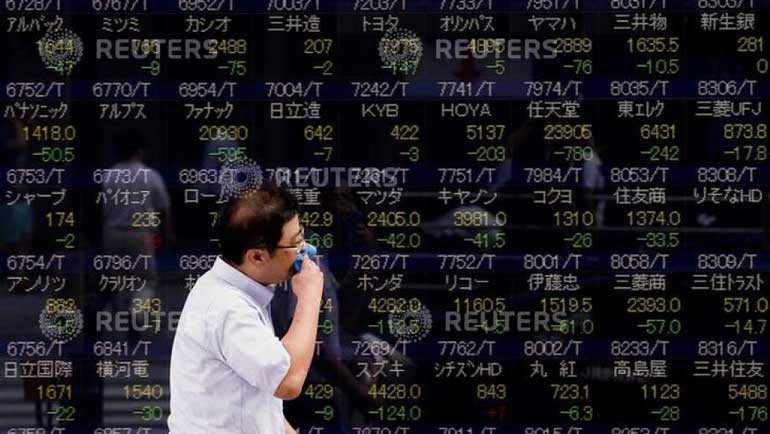Monday Feb 23, 2026
Monday Feb 23, 2026
Thursday, 20 August 2015 00:00 - - {{hitsCtrl.values.hits}}

Asian shares retreated to two-year lows on Wednesday after Chinese stocks extended their plunge, continuing to stoke fears about the stability of China’s economy.
With Chinese stocks steepening their decline, spreadbetters forecast a lower open from Britain’s FTSE, Germany’s DAX and France’s CAC.
The Shanghai Composite Index retreated 2.8%, extending Tuesday’s 6% slide, amid growing worries that the government could be scaling back its rescue efforts.
“Market confidence was hit the most by signs that the ‘national team’ is starting to retreat,” Zhou Lin, analyst at Huatai Securities said, referring to government funds that bought stocks in early summer to halt a market rout.
China’s securities regulator said late last week that the market had normalised and the government would allow market forces to play a bigger role in determining stock prices.
Japan’s Nikkei fell 1.5% and South Korea’s Kospi lost 1.3%.
“Investors care about these two things - China’s economy and the timing of a US rate hike. These two concerns dominate their minds now,” said Masaru Hamasaki, head of market and investment information department at Amundi Japan.
MSCI’s broadest index of Asia-Pacific shares outside Japan slid to a two-year low and was last down 0.3%. Australian stocks bucked the trend and climbed 1.3%.
The yuan, which tanked last week after China’s shock devaluation but has shown signs of stabilising after Beijing later worked to arrest its fall, has begun to feel the tremors from sliding Chinese equities.
Spot yuan was changing hands at 6.3993 per dollar, slightly weaker than Tuesday’s close of 6.3938.
“We think yesterday’s stock market crash (in China) reinforced yuan depreciation sentiment, which will encourage more capital outflows, necessitating more open market operations and ultimately a reserve requirement ratio cut in the current quarter,” strategists at ING wrote.
The spectre of a slowdown in China’s economic growth and a US interest rate hike have hit asset markets in emerging economies hardest.
MSCI’s emerging market index fell to its lowest level since October 2011. It has dropped more than 20% from the year’s peak hit in April.
Concerns about slowing demand from China for commodities also hit copper prices, which slid to a six-year low of $4,983 a ton, breaking the psychological $5,000 level. It last stood at $5,012.00 a ton.
That in turn knocked copper exporters, with the Chilean peso sinking to 12-year lows.
Ripples were also felt in other emerging currencies following China’s surprise move to weaken the yuan last week. Vietnam widened the dollar/dong trading band to 3% from 2%, the second move in a week, in an effort to protect its exports.
A number of emerging market currencies, meanwhile, are facing capital outflows as investors shift funds to the dollar, on which interest rates look set to rise.
US housing starts rose to a near eight-year high in July as builders ramped up construction of single-family homes, supporting the case for a rate hike.
Many investors and economists see the Fed as most likely to make its first hike in nearly a decade next month as the labour market continues to improve.
The minutes of the Federal Reserve’s July meeting due later on Wednesday will be scrutinised with extra care for any new clues on the Fed’s likely timing.
The prospects of higher rates supported the dollar against most other currencies. The euro traded at $1.1052, having hit a one-week low of $1.1016 on Tuesday.
Oil resumed falling after a brief bounce on Tuesday. Prospects of demand from the United States weakening during the upcoming autumn and a slowdown in Asia’s leading economies have weighed on the commodity.
US crude futures were down 0.6% at $42.38 per barrel, edging back towards a 6-1/2-year low of $41.35 struck on Friday. Brent crude was down 0.5% at $48.56 a barrel and in reach of 6-1/2-month troughs.